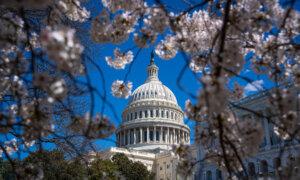Lawmakers must pass the package by 11:59 p.m. on Friday to avert a partial government shutdown.
The package, which funds half of the 12 yearly government spending bills, starts a mad dash by Congress to approve over $1 trillion in spending. The bills cover funding for the departments of Defense, Homeland Security, Health and Human Services, Labor, and others.
Speaker Mike Johnson (R-La.) said in a statement that the funding bills are a “serious commitment to strengthening our national defense by moving the Pentagon toward a focus on its core mission while expanding support for our brave men and women who serve in uniform.”
Earlier this month, Congress passed a minibus—or small omnibus—of six appropriations bills, providing funding for roughly 30 percent of the federal government through the rest of the fiscal year. That package was passed against another shutdown deadline.
Now legislators have less than two days to pass the package and send it to President Joe Biden’s desk.
Republicans in the House are expecting for a vote on Friday, but Senate procedure might cause the consideration process to linger into the weekend. In the upper chamber, one senator has the power to delay a bill’s speedy vote.
Republicans have focused their legislative attention on several aspects of the package, such as reductions in overall foreign aid funding, the removal of funding to a United Nations agency that aids Palestinian refugees, funding cuts for non-governmental organizations, and the retraction of previously obtained concessions that took money away from the IRS and coronavirus relief efforts.
Appropriations Committee Chairwoman Kay Granger (R-Texas) made a statement on the bills, titled The Further Consolidated Appropriations Act, 2024.
A press release from her committee published the statement where she asserted, “House Republicans made a commitment to strategically increase defense spending, make targeted cuts to overfunded non-defense programs, and pull back wasteful spending from previous years. I am proud to say that we have delivered on that promise, and this bill is proof.
“Given that the world is becoming more dangerous, we wanted to send a strong message that we will do everything in our power to protect the American people and defend our interests,” the Texas Republican went on.
“This bill funds our highest national security priorities – it invests in a more modern, innovative, and ready fighting force, continues our strong support for our great ally Israel, and provides key border enforcement resources. At the same time, we made cuts to programs that have nothing to do with our national security and pulled back billions from the Administration.”
Republicans appear to have taken a strategic approach to defense spending, while targeting what they deem as wasteful expenditures.
The bills within the package reflect some of the party’s key priorities, including ramping up defense appropriations, curbing excessive spending, and redirecting resources towards countering perceived threats, particularly from the People’s Republic of China (PRC) and other adversaries.
Highlighted in the proposed legislation is the Defense Appropriations Act, which notably sees a substantial increase of $27 billion in funding aimed at arming U.S. servicemembers with the necessary tools for national defense. This act also takes aim at what Republicans view as excessive spending in the President’s Budget Request, redirecting these funds towards activities focused on countering adversaries like the PRC.
Additionally, the State, Foreign Operations, and Related Programs Act signifies the party’s commitment to prioritizing American interests by slashing overall spending by six percent. Notably, the act seeks to hold organizations like the United Nations accountable for perceived biases against American allies, while reaffirming unwavering support for Israel through various funding commitments and prohibitions on funding certain UN initiatives.
The proposed budget also aims to rein in spending by partially defunding initiatives, including efforts to expand the IRS workforce by 85,000 agents, which Republicans argue are targeted at everyday Americans.
Furthermore, the Homeland Security Appropriations Act for 2024 underscores a focus on border security, with provisions funding an increased number of Border Patrol agents and detention bed levels.
Investments in border security technology, such as Autonomous Security Towers and tunnel detection equipment, are also emphasized, reflecting a commitment to combating issues like drug trafficking, particularly the trafficking of substances like fentanyl.
Key provisions, including prohibitions on hiring illegal aliens and transferring firearms to suspected cartel agents, are maintained, signaling a commitment to longstanding bipartisan measures.
House Appropriations Committee Ranking Member Rosa DeLauro (D-Conn.) weighed in on the bills released by her committee, saying “Democrats and Republicans in the House and Senate were able to come together and complete the business of funding the United States government for 2024 with this second and final six-bill funding package.
“While House Republicans previously blocked efforts to pass bipartisan supplemental funding legislation aimed at bolstering national security and securing our border, this package includes robust funding for the Department of Homeland Security and rejects the adoption of extreme House Republican policies. I am proud to support this legislation, and I am relieved to be finally closing the chapter on fiscal year 2024 on behalf of the American people.”
Ms. DeLauro noted what her party sees as the “strongest investments and victories for the American people” in the package, including the allocation of $1 billion in increased funding for child care and Head Start programs. A $120 million increase for funding of cancer research at the National Institutes of Health and a $100 million increase in funding for Alzheimer’s and Alzheimer’s disease-related dementia research.
The Democrats on the committee also lauded a rejection in Republican cuts that would have ended funding for 224,000 teachers’ jobs, as well as blocking 10 Republican riders that would have limited women’s reproductive health.
Near the end of her comments, Ms. Granger added a comment to her fellow lawmakers, “With the odds stacked against us, House Republicans have refocused spending on America’s interests, at home and abroad, and I urge support of this bill.”
This is developing and will be updated.
Samantha Flom contributed to this report.
Original News Source Link – Epoch Times
Running For Office? Conservative Campaign Consulting – Election Day Strategies!


